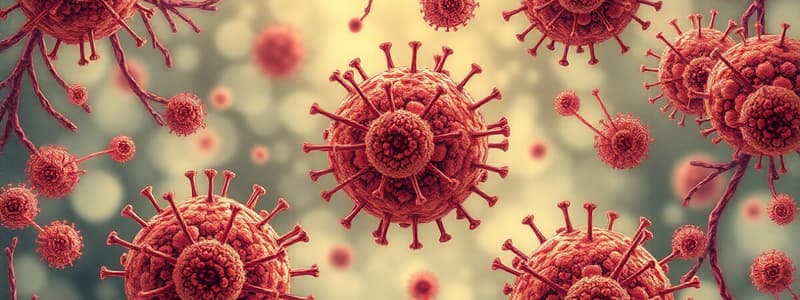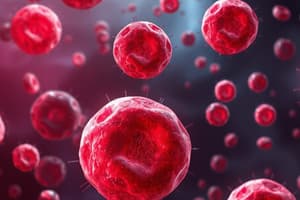Podcast
Questions and Answers
Which of the following immune cells are generated in the bone marrow but mature in the thymus?
Which of the following immune cells are generated in the bone marrow but mature in the thymus?
- Cytotoxic T-lymphocytes (correct)
- B-lymphocytes
- Neutrophils
- Monocytes
Innate immune cells such as neutrophils, monocytes, eosinophils and basophils all originate and mature in the:
Innate immune cells such as neutrophils, monocytes, eosinophils and basophils all originate and mature in the:
- Thymus
- Bone marrow (correct)
- Lymph nodes
- Spleen
Where do adaptive immune cells such as B-lymphocytes all originate and mature?
Where do adaptive immune cells such as B-lymphocytes all originate and mature?
- Bone marrow (correct)
- Spleen
- Lymph nodes
- Thymus
For T-lymphocytes to become either cytotoxic or helper T-lymphocytes, they must mature in the:
For T-lymphocytes to become either cytotoxic or helper T-lymphocytes, they must mature in the:
Which of the following cell types differentiates directly from monocytes?
Which of the following cell types differentiates directly from monocytes?
What is the initial site of development for all lymphocytes?
What is the initial site of development for all lymphocytes?
What is the role of the thymus in the differentiation of T lymphocytes:
What is the role of the thymus in the differentiation of T lymphocytes:
Which type of immune cell is primarily associated with adaptive immune responses rather than innate responses?
Which type of immune cell is primarily associated with adaptive immune responses rather than innate responses?
Which of the cells matures in a location other than the bone marrow?
Which of the cells matures in a location other than the bone marrow?
Based on the differentiation pathways of immune cells, which of the following is capable of differentiating into macrophages?
Based on the differentiation pathways of immune cells, which of the following is capable of differentiating into macrophages?
A researcher is studying the development of immune cells and wants to isolate hematopoietic stem cells. From which location should the researcher obtain these cells?
A researcher is studying the development of immune cells and wants to isolate hematopoietic stem cells. From which location should the researcher obtain these cells?
A patient has a genetic defect that impairs the development of the thymus. Which type of immune cell would be most affected by this condition?
A patient has a genetic defect that impairs the development of the thymus. Which type of immune cell would be most affected by this condition?
If a patient's bone marrow is damaged which of the following would be a direct consequence?
If a patient's bone marrow is damaged which of the following would be a direct consequence?
Which process primarily occurs in the bone marrow?
Which process primarily occurs in the bone marrow?
Which characteristic distinguishes the maturation process of T-lymphocytes from that of B-lymphocytes?
Which characteristic distinguishes the maturation process of T-lymphocytes from that of B-lymphocytes?
In an individual with a monocyte deficiency, which subsequent immune response would likely be impaired?
In an individual with a monocyte deficiency, which subsequent immune response would likely be impaired?
Which statement accurately describes the relationship between monocytes and macrophages?
Which statement accurately describes the relationship between monocytes and macrophages?
Which is an example of how innate and adaptive immunity cooperate to clear an infection?
Which is an example of how innate and adaptive immunity cooperate to clear an infection?
Following a bone marrow transplant, what aspect of the recipient's immune system is most directly affected?
Following a bone marrow transplant, what aspect of the recipient's immune system is most directly affected?
Unlike other immune cells, T lymphocytes are unique because they:
Unlike other immune cells, T lymphocytes are unique because they:
Flashcards
Bone Marrow
Bone Marrow
The primary location for the generation of immune cells, including neutrophils, monocytes, eosinophils, basophils and B-lymphocytes.
Neutrophil
Neutrophil
An innate immune cell that differentiates from monocytes in the bone marrow and blood, eventually migrating into tissues.
B-lymphocyte
B-lymphocyte
An adaptive immune cell that matures in the bone marrow.
T-lymphocyte
T-lymphocyte
Signup and view all the flashcards
Cytotoxic T-lymphocyte
Cytotoxic T-lymphocyte
Signup and view all the flashcards
Helper T-lymphocyte
Helper T-lymphocyte
Signup and view all the flashcards
Pluripotent hematopoietic stem cell
Pluripotent hematopoietic stem cell
Signup and view all the flashcards
Monocyte
Monocyte
Signup and view all the flashcards
Natural killer T-lymphocyte
Natural killer T-lymphocyte
Signup and view all the flashcards
Eosinophil and Basophil
Eosinophil and Basophil
Signup and view all the flashcards
Study Notes
- Immune cells originate and mature in specific locations within the body
- Immune cells can be categorized as either innate or adaptive
Immune Cell Generation and Maturation
- Neutrophils, monocytes, eosinophils, and basophils are innate immune cells that are generated and mature in the bone marrow
- B-lymphocytes, an adaptive immune cell, are also generated and mature in the bone marrow
- Natural killer T-lymphocytes (innate), cytotoxic T-lymphocytes (adaptive), and Helper T-lymphocytes (adaptive) are generated in the bone marrow but mature in the thymus
Immune Cell Differentiation
- Pluripotent hematopoietic stem cells in the bone marrow give rise to common lymphoid progenitors and common myeloid progenitors
- Common lymphoid progenitors differentiate into B cells, T cells, and NK cells in the lymph nodes
- Common myeloid progenitors differentiate into granulocyte/macrophage progenitors and megakaryocyte/erythrocyte progenitors in the bone marrow
- Granulocytes differentiate into neutrophils, eosinophils, and basophils located in blood.
- In blood monocytes differentiate into neutrophils
- In tissues, monocytes differentiate into macrophages or dendritic cells
- B cells, T cells and NK cells are found inside the lymph nodes
- Mature dendritic cells, mast cells, and macrophages are present in tissues
- Effector cells, including activated plasma cells, activated T cells, and activated NK cells, are also located in the lymph nodes
Studying That Suits You
Use AI to generate personalized quizzes and flashcards to suit your learning preferences.
Related Documents
Description
Explore the origin and maturation of immune cells within the body. Differentiate between innate and adaptive immune cells, with a focus on generation in bone marrow and maturation in the thymus. Learn about the differentiation process from pluripotent hematopoietic stem cells to various immune cell types.




